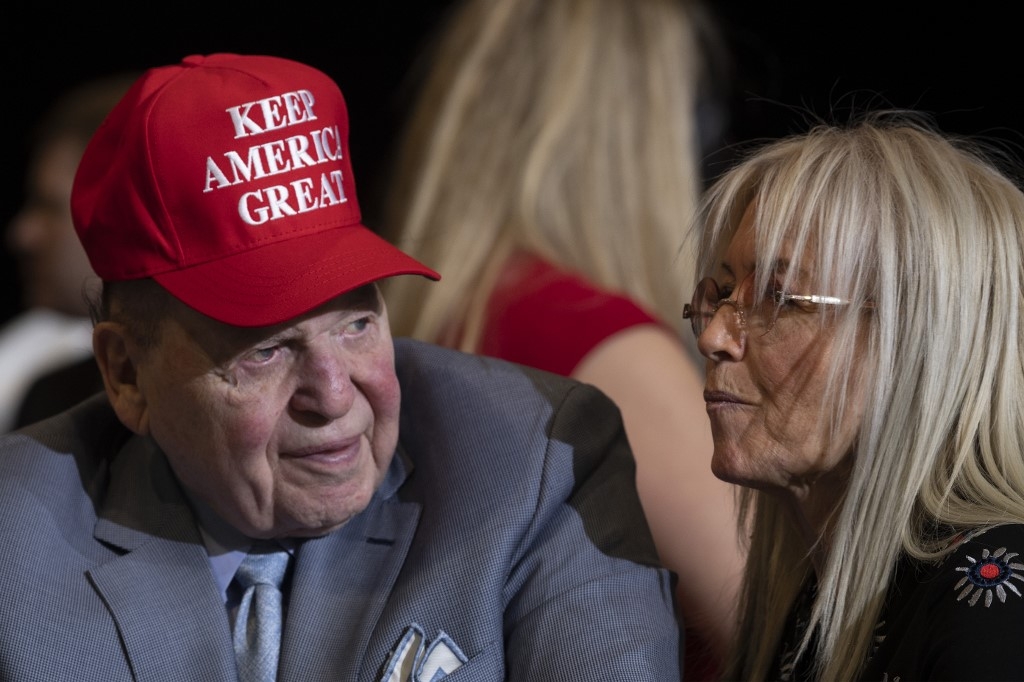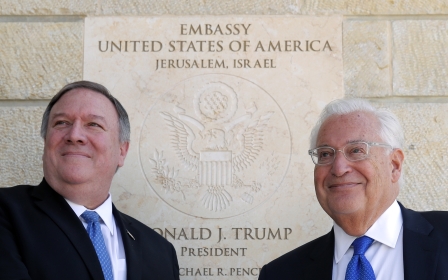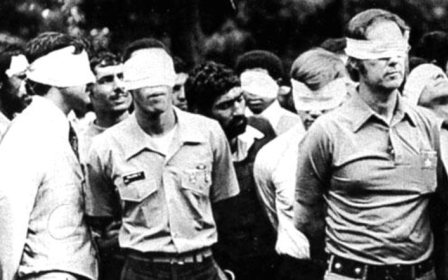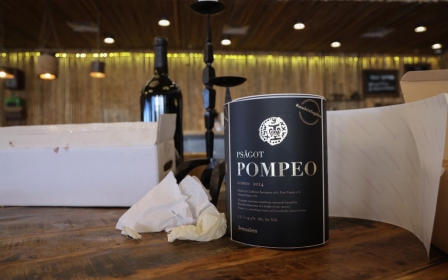US sold Tel Aviv ambassador's home to billionaire Trump-backer for $67m

The United States sold its ambassador's residence in Israel for more than $67m in July, according to an official Israeli record of the sale, details of which have reportedly been concealed by the Trump administration.
The US State Department in September confirmed it had sold the home, a sprawling beachfront compound in Tel Aviv's upscale Herzliya suburb, but would not release details such as who purchased it - or for how much.
New MEE newsletter: Jerusalem Dispatch
Sign up to get the latest insights and analysis on Israel-Palestine, alongside Turkey Unpacked and other MEE newsletters
The Israeli business newspaper Globes, however, has identified the buyer as US billionaire and casino magnate Sheldon Adelson, the Associated Press reported on Tuesday.
Adelson has been a loyal supporter of US President Donald Trump and Israeli Prime Minister Benjamin Netanyahu.
His $67m purchase appears to be the most expensive single residence ever sold in Israel, according to AP.
'Open and transparent'?
Records posted by Israel's tax authority on Monday show that the sale was concluded on 31 July, several weeks before the State Department acknowledged it, AP reported.
The State Department on Tuesday told the news agency that the sale had been "open and transparent and included professional appraisals and advice to maximize value".
"The buyer was selected solely on the basis that they submitted the highest offer," it added. But the State Department has yet to reveal how many bids were made or by whom.
Meanwhile, Congressional aides in September reported that lawmakers in both chambers were looking into whether the sale complied with regulations.
The sale of the Tel Aviv residence took place following the Trump administration's controversial decision to move the US embassy to Jerusalem in 2018. Unloading the property from the US portfolio was seen as a move to further cement the relocation by making it more difficult for future administrations to reverse it.
While President-elect Joe Biden criticised the embassy move, he has said he will not attempt to reverse the decision and instead plans to reopen the US consulate in occupied East Jerusalem to serve Palestinians.
New Jerusalem embassy
Israel approved the construction of a permanent US embassy in Jerusalem earlier this month. At the time, Moshe Leon, the Israeli mayor of Jerusalem, said building would begin within the next six months and could be expected to be completed in a "few years".
Occupied by Israel in 1967 and later annexed in a move that remains unrecognised by the international community, East Jerusalem's status has historically been left to negotiations between Israel and the Palestinians.
Nearly all countries maintain their embassies in Tel Aviv because of the dispute over East Jerusalem.
Trump's gifts to Israel
+ Show - HideThe Trump administration's bombshell announcement that it no longer considers Israeli settlements in the occupied West Bank illegal under international law has sent shockwaves through the region.
But it's only the latest in a long line of unilateral gifts offered by Donald Trump to Israel since the president took up residence in the White House in January 2017.
Middle East Eye takes a look at how Trump has promoted Israeli interests at the expense of the Palestinians:
Pro-Israel aides: Friedman, Kushner and Greenblatt
From the first moment Trump stepped in the Oval Office he appointed a raft of aides with close ties to Israel and the settlement movement.
Two of the first, and most prominent, tasked with dealing with the Israel-Palestine conflict were Jared Kushner, his son-in-law, and Jason Greenblatt, his personal lawyer.
Kushner and Greenblatt have been heavily involved in the so-called "deal of the century" peace plan, however their loyalties are heavily weighed in Israel's favour.
Kushner's family are close friends of Israeli Prime Minister Benjamin Netanyahu, and donated money to settlement organisations.
As Middle East envoy, Greenblatt, meanwhile, has consistently defended Israeli actions against Palestinians.
David Friedman, US ambassador to Israel, has been the Israelis' chief cheerleader since taking office in May 2017, telling the New York Times that “under certain circumstances, I think Israel has the right to retain some, but unlikely all, of the West Bank".
In July, Friedman and Greenblatt opened a highly controversial tunnel under the Palestinian neighbourhood of Silwan in occupied East Jerusalem.
The US ambassador was seen taking a hammer to a wall in the ancient archaeological site with particular zeal, in an event organised by settler group ELAD.
Recognising Jerusalem as Israel's capital
In a clear sign that Washington was prepared to upend years of convention and consensus in Israel's favour, Trump announced in December 2018 that the United States recognised Jerusalem as the Israeli capital.
East Jerusalem has been occupied since the 1967 Middle East war, and the Palestinians seek it as their capital of any future state.
The international community has maintained that Jerusalem's status must be agreed upon in a settlement between the Israelis and Palestinians, and in response to Trump's move 128 states condemned the decision in a UN General Assembly vote.
On 14 May 2018 - the 70th anniversary of Israel's founding - the US officially moved its embassy from Tel Aviv to Jerusalem.
Demonstrations erupted in the Gaza Strip and the West Bank, with Israeli forces killing at least 57 Palestinians as Kushner and his wife Ivanka Trump grinned at the embassy's opening.
Cutting funds for UNRWA
In early 2019, the US cut all funding to the UN agency that supports Palestinian refugees, UNRWA, saying its business model and fiscal practices were of an "irredeemably flawed operation".
UNRWA provides services to about five million Palestinian refugees, with the US a significant donor since the agency's founding following the 1948 creation of Israel.
In 2018, Washington gave UNRWA $125m in aid, and the agency has scrambled to make up for the sudden shortage.
The Golan Heights
In another unilateral decision, Trump in March announced that the US recognised Israeli sovereignty over the occupied Golan Heights.
The Golan was captured from Syria in 1967 and is both highly strategic and resource-rich. The majority of its inhabitants are Syrian Druze, who largely refuse to engage with Israeli rule.
Some 20,000 illegal Israeli settlers also live on the plateau.
Trump's decree was a gift to Israeli Prime Minister Benjamin Netanyahu ahead of the April elections, and was signed in his presence alongside Friedman, Greenblatt and Kushner.
However, in December 2017, President Trump unilaterally recognised Jerusalem as Israel’s capital, subsequently moving the embassy from Tel Aviv in May 2018.
Palestinian leaders want East Jerusalem to be the capital of a future Palestinian state and view the US embassy move as evidence Washington supports Israel's de facto annexation of the city.
The current US embassy is in a building in the Arnona neighbourhood, used in the past as a visa consulate. The area lies on the border between East and West Jerusalem and was largely off-limits until Israel seized the entire city.
Multiple US allies condemned the move, and on its inauguration in May 2018 Israeli forces violently cracked down on a Palestinian protest in the Gaza Strip, killing more than 50 Palestinian protesters.
Middle East Eye delivers independent and unrivalled coverage and analysis of the Middle East, North Africa and beyond. To learn more about republishing this content and the associated fees, please fill out this form. More about MEE can be found here.





